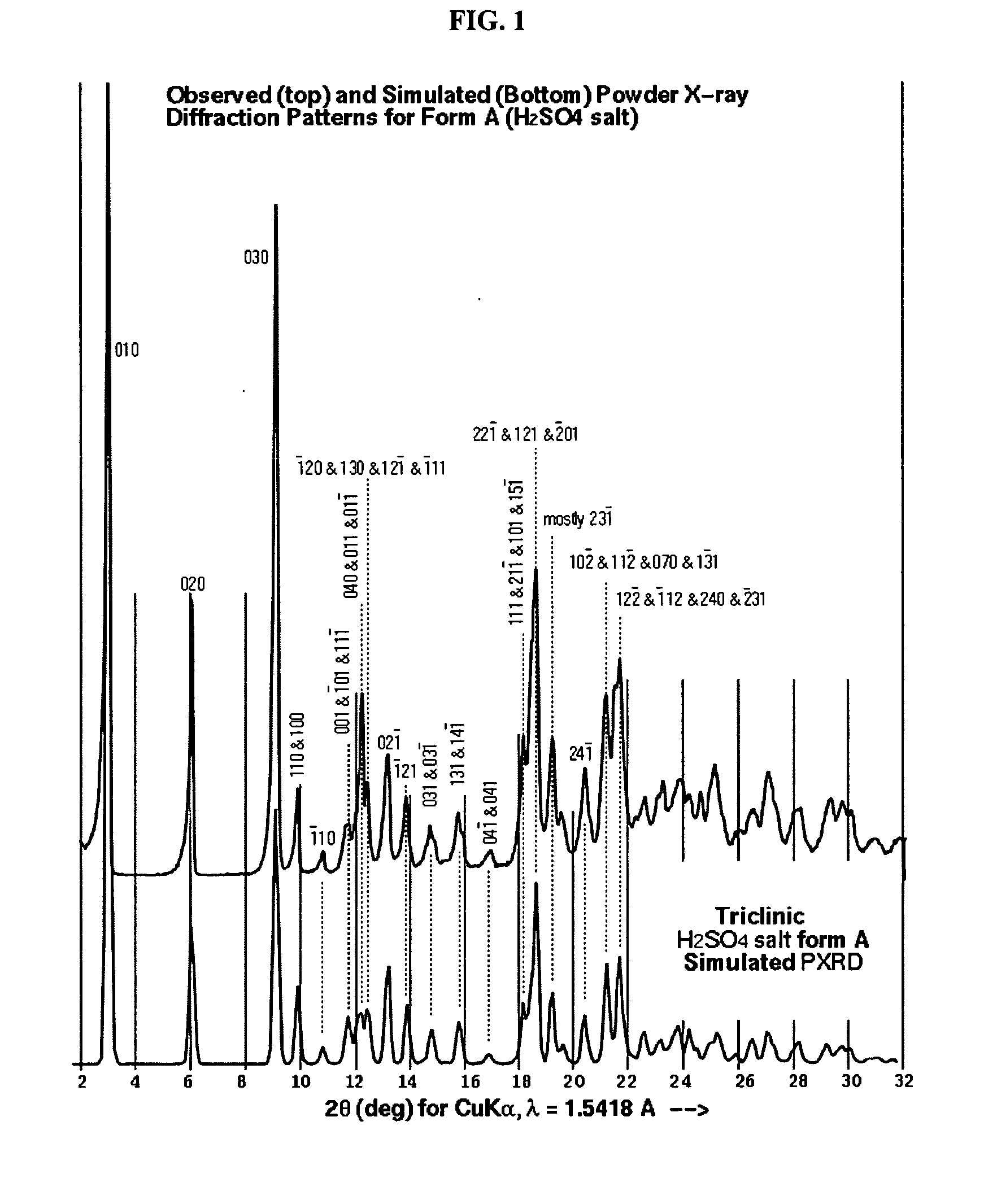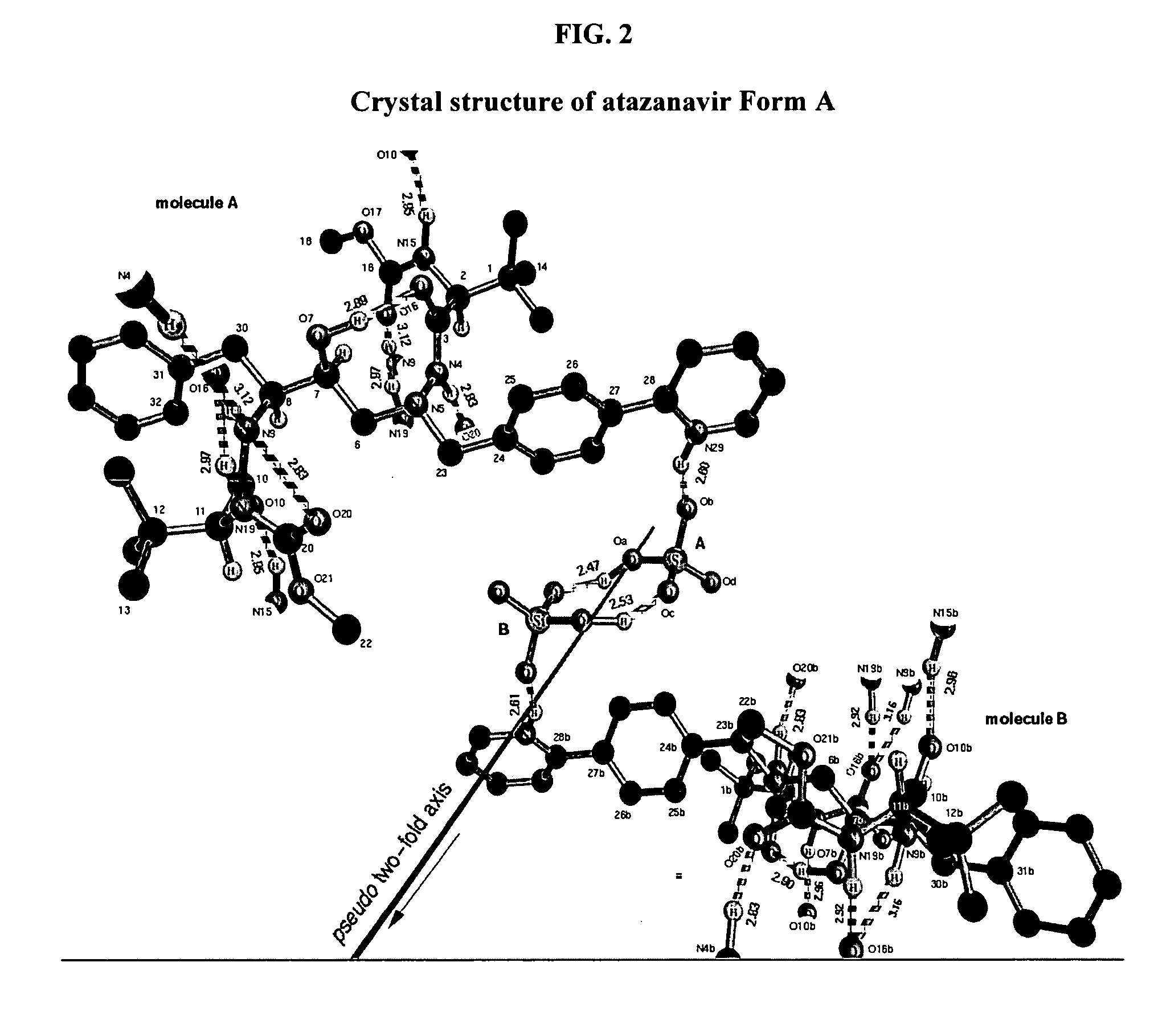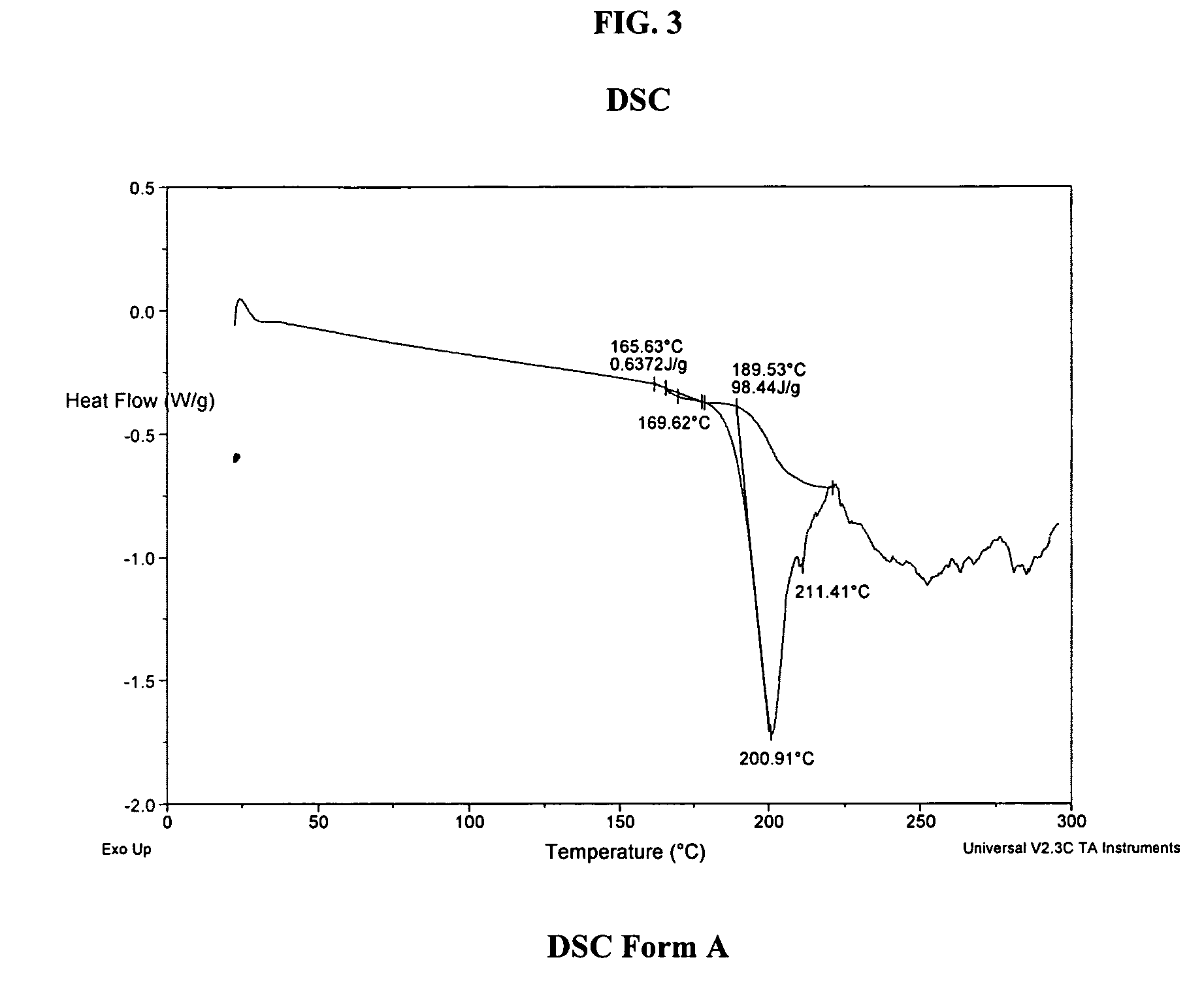Process for preparing atazanavir bisulfate and novel forms
a technology of atazanavir and bisulfate, which is applied in the field of process for preparing atazanavir bisulfate and novel forms, can solve the problem of unstable diamine free bas
- Summary
- Abstract
- Description
- Claims
- Application Information
AI Technical Summary
Benefits of technology
Problems solved by technology
Method used
Image
Examples
example 1
1-[4-(Pyridin-2-yl)phenyl]-5(S)-2,5-bis{[N-(methoxycarbonyl)-L-tert-leucinyl]amino}-4-(S)-hydroxy-6-phenyl-2-azahexane, Bisulfate salt (Form A) (Atazanavir bisulfate—Form A)
[0127] A.
(1-[4-(Pyridin-2-yl)phenyl]-5(S)-2,5-bis[tert-butyloxycarbonyl)amino]-4(S)-hydroxy-6-phenyl-2-azahexane.3HCl (Triamine.3HCl Salt))
[0128] To a 1000 mL, 3-neck, round-bottom flask fitted with mechanical stirrer, nitrogen inlet and temperature probe was added the protected triamine 1-[4-(pyridin-2-yl)phenyl]-5(S)-2,5-bis[tert-butyloxycarbonyl)amino]-4(S)-hydroxy-6-phenyl-2-azahexane
(100 g, 0.178 mol), and CH2Cl2 (500 mL; 5 mL / g of protected triamine input) (prepared as described in Z. Xu et al., Process Research and Development for an Efficient Synthesis of the HIV Protease Inhibitor BMS-232,632, Organic Process Research and Development, 6, 323-328 (2002)) and the resulting slurry was agitated while maintaining the temperature at from about 5 to about 22° C.
[0129] Concentrated hydrochloric acid (68 ...
example 2
Atazanavir Bisulfate—Pattern C Material
Method A:
[0154] Form A crystals of atazanavir bisulfate (prepared as described in Example 1) (25.33 g) were suspended in 200 mL of water and the mixture was stirred mechanically to produce a thick gel which was dried.
[0155] The dried mixture was ground with a spatula to produce Pattern C material. A powder X-ray diffraction pattern of Pattern C material is shown in FIG. 6.
Method B:
[0156] Form A crystals of atazanavir bisulfate was wet granulated using a sufficient amount of water (about 40% w / w) in a suitable mixer-granulator. The wet mass was dried in an oven. The product was sized using a suitable screen. The x-ray diffraction pattern of the resultant product is consistent with Pattern C material as shown in FIG. 6.
[0157] Pattern C is characterized by the differential scanning calorimetry thermogram shown in FIG. 7 having an endotherm typically in the range from about 76.7 to about 96.6° C. and from about 156.8 to about 165.9° C.
[015...
example 3
Atazanavir Bisulfate—Form E3 (Triethanol Solvate)
[0159] Atazanavir free base (prepared as described in Example 1, Part C) (3.0 g, 4.26 mmol) was slurried in dry, 200 proof ethanol (20.25 mL, 6.75 mL / g of free base) in a 100 mL, 3-neck round-bottom flask fitted with a mechanical stirrer, temperature probe, and a pressure-equalizing liquid addition funnel.
[0160] Concentrated H2SO4 (0.25 mL, 0.46 g, 4.69 mmol, 1.1 eq.) was added to the slurry of atazanavir free base which was maintained at 20-25° C. The resulting solution (KF of 0.2 to 1.0% water) was polish filtered (Whatman #1 paper), the filter rinsed with 2.25 mL of absolute ethanol and the rinse added to the filtered solution. The solution was heated to 37° C. and seeded with 10 mg of amorphous atazanavir bisulfate derived from Form E3 crystals (by exposing Form E3 crystals to ambient temperature), and the mixture was agitated for 15 min. Heptane (380 mL, 8.25 mL / g of free base) was added over 1 hour. The resulting crystallizati...
PUM
| Property | Measurement | Unit |
|---|---|---|
| Temperature | aaaaa | aaaaa |
| Temperature | aaaaa | aaaaa |
| Temperature | aaaaa | aaaaa |
Abstract
Description
Claims
Application Information
 Login to View More
Login to View More - R&D
- Intellectual Property
- Life Sciences
- Materials
- Tech Scout
- Unparalleled Data Quality
- Higher Quality Content
- 60% Fewer Hallucinations
Browse by: Latest US Patents, China's latest patents, Technical Efficacy Thesaurus, Application Domain, Technology Topic, Popular Technical Reports.
© 2025 PatSnap. All rights reserved.Legal|Privacy policy|Modern Slavery Act Transparency Statement|Sitemap|About US| Contact US: help@patsnap.com



